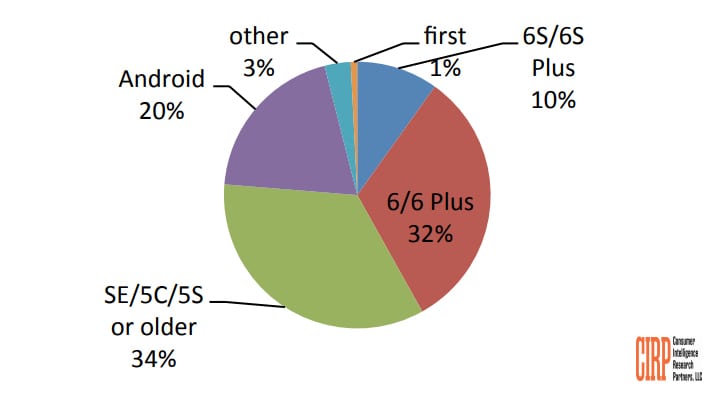Will Android's Updated Interface Win Over Young IPhone Users?

Table of Contents
Appeal of the iPhone Ecosystem: Why Young Users are Loyal to Apple
Young users often exhibit strong loyalty to Apple, a phenomenon driven by several key factors. This loyalty isn't just about brand recognition; it's rooted in the seamless integration of Apple's products and services.
Seamless Apple Ecosystem Integration
The Apple ecosystem is renowned for its interconnectedness. iMessage, iCloud, and AirDrop create a cohesive user experience that's incredibly difficult to replicate.
- Easy file sharing: AirDrop allows for effortless transfer of files between Apple devices.
- Consistent user experience: The interface and functionality across iPhones, iPads, and Macs are remarkably similar, making the transition between devices smooth and intuitive.
- Strong brand loyalty: Apple cultivates a strong sense of community and brand loyalty, fostering a feeling of belonging among its users.
Switching from this ecosystem is a significant undertaking. The inconvenience of migrating data, losing contact with iMessage users, and adapting to a new interface can be deterrents. Furthermore, social pressure within peer groups often reinforces the choice to stay within the Apple ecosystem.
App Store Quality and Exclusivity
The Apple App Store has a reputation for high-quality apps, often perceived as superior in design and functionality compared to their Android counterparts.
- High-quality design standards: Apple’s stringent app review process leads to a more consistent and polished user experience.
- Fewer issues with app functionality: Apps on the App Store tend to have fewer bugs and glitches, resulting in a smoother user experience.
- Access to premium apps not found on Android: Some popular apps are either exclusive to iOS or offer enhanced features on iOS.
Apps like Snapchat and Instagram, for example, have historically been perceived by many young users as offering a superior experience on iOS. User reviews and app store ratings often reflect this sentiment, further solidifying Apple's position in the minds of young users.
Android's New Interface and Features: A Compelling Counter-Offer
While the iPhone ecosystem is undeniably strong, Android has significantly improved its interface and features, offering a compelling alternative.
Improved User Interface and Customization
Modern Android versions boast a more refined and intuitive user interface. Extensive customization options allow users to personalize their home screens and overall experience.
- Intuitive navigation: The navigation gestures and overall menu structure are now much more streamlined and user-friendly.
- Customizable home screens: Users can tailor their home screens with widgets, different launchers, and icon packs, creating a unique visual experience.
- Extensive widget options: A vast array of widgets provides quick access to information and frequently used apps.
These features offer a level of personalization unmatched by iOS, appealing to users who want to customize their phone to reflect their individual tastes. A direct comparison of Android's latest UI to iOS often reveals a greater degree of flexibility and visual customization in Android.
Performance and Power
Android devices have made significant strides in performance, offering comparable, and in some cases superior, speed, battery life, and overall functionality.
- Faster processing: Modern Android phones often utilize high-end processors that rival or exceed the performance of iPhones.
- Improved battery efficiency: Advancements in battery technology and software optimization have resulted in longer battery life on many Android devices.
- Smoother app performance: Many Android devices now provide a fluid and responsive app experience that matches, or even surpasses, that of iOS devices.
Benchmark tests frequently show Android devices competing favorably with iPhones in terms of processing speed and graphical performance. Features like adaptive battery management further enhance battery life, addressing a long-standing concern among smartphone users.
Addressing Key Concerns of Young Users: Debunking Myths
Some misconceptions about Android still persist among young users, hindering its adoption.
Security and Privacy
Concerns about security and privacy have traditionally favored Apple's reputation. However, Android has made significant advancements.
- Improved malware protection: Google has invested heavily in improving Android's security features, making it more resistant to malware and other threats.
- Privacy settings: Android offers granular control over privacy settings, allowing users to customize data sharing and permissions.
- Data encryption: Enhanced data encryption protects user information from unauthorized access.
Google actively works to improve Android security, regularly releasing updates to address vulnerabilities. Comparing Google's security initiatives with Apple's reveals a growing convergence in the approaches to protecting user data.
Social Media Integration
The seamless integration of social media apps is critical for young users. Android addresses previous concerns in this area.
- Native support for major platforms: All major social media platforms offer Android apps, fully compatible with the Android operating system.
- Smooth experience across all apps: The performance and functionality of social media apps on Android are generally comparable to iOS.
While perceptions may linger that certain apps are better on iOS, this often stems from past experiences rather than current reality. The performance and feature sets of social media apps across both platforms are now largely equivalent.
Conclusion: The Android Challenge
While the allure of the iPhone ecosystem and its App Store remains powerful, Android's updated interface and enhanced features present a strong contender. The improved UI, customization options, performance gains, and strengthened security and privacy measures create a compelling argument for switching. The success of Android in attracting young iPhone users hinges on effectively communicating these improvements and addressing lingering perceptions. Will Android's updated interface ultimately win over young iPhone users? Only time will tell. But the advancements are significant enough to warrant a closer look. Consider exploring the latest Android devices and comparing them side-by-side with your iPhone to see if making the switch is right for you. Learn more about the latest Android interface improvements and decide for yourself: Will Android's updated interface win you over?

Featured Posts
-
 Ne Vse Soyuzniki Ukrainy V Kieve 9 Maya Politicheskiy Analiz
May 09, 2025
Ne Vse Soyuzniki Ukrainy V Kieve 9 Maya Politicheskiy Analiz
May 09, 2025 -
 Changes To Uk Visa System Implications For International Students And Workers
May 09, 2025
Changes To Uk Visa System Implications For International Students And Workers
May 09, 2025 -
 Polish Womans Madeleine Mc Cann Impersonation Leads To Stalking Charges
May 09, 2025
Polish Womans Madeleine Mc Cann Impersonation Leads To Stalking Charges
May 09, 2025 -
 Returning Tonight High Potential Season 2 Information And Episode Count
May 09, 2025
Returning Tonight High Potential Season 2 Information And Episode Count
May 09, 2025 -
 Is High Potential The Future Of Psych Spiritual Development An 11 Year Retrospective
May 09, 2025
Is High Potential The Future Of Psych Spiritual Development An 11 Year Retrospective
May 09, 2025
